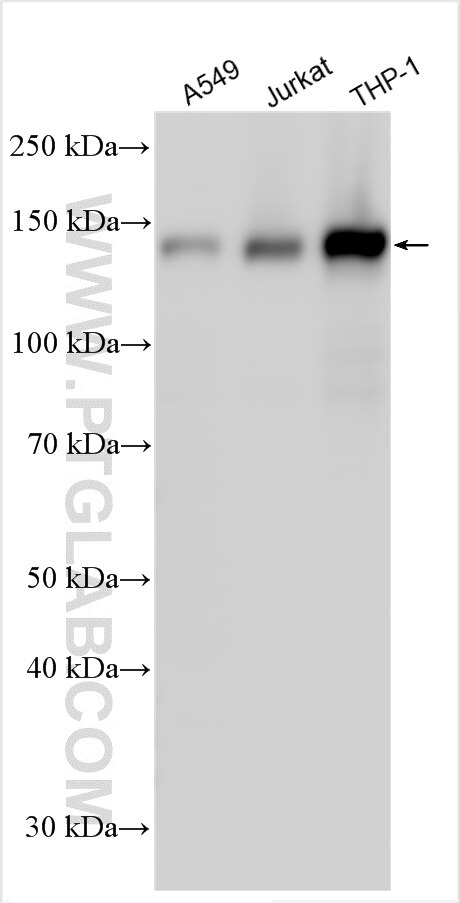Tested Applications
| Positive WB detected in | A549 cells, Jurkat cells, THP-1 cells |
Recommended dilution
| Application | Dilution |
|---|---|
| Western Blot (WB) | WB : 1:500-1:2000 |
| It is recommended that this reagent should be titrated in each testing system to obtain optimal results. | |
| Sample-dependent, Check data in validation data gallery. | |
Product Information
31546-1-AP targets UTY in WB, ELISA applications and shows reactivity with human samples.
| Tested Reactivity | human |
| Host / Isotype | Rabbit / IgG |
| Class | Polyclonal |
| Type | Antibody |
| Immunogen | UTY fusion protein Ag35806 Predict reactive species |
| Full Name | ubiquitously transcribed tetratricopeptide repeat gene, Y-linked |
| Calculated Molecular Weight | 150kDa,1347aa |
| Observed Molecular Weight | 130-160kDa |
| GenBank Accession Number | NM_007125.4 |
| Gene Symbol | UTY |
| Gene ID (NCBI) | 7404 |
| RRID | AB_3670033 |
| Conjugate | Unconjugated |
| Form | Liquid |
| Purification Method | Antigen affinity Purification |
| UNIPROT ID | O14607 |
| Storage Buffer | PBS with 0.02% sodium azide and 50% glycerol, pH 7.3. |
| Storage Conditions | Store at -20°C. Stable for one year after shipment. Aliquoting is unnecessary for -20oC storage. 20ul sizes contain 0.1% BSA. |
Background Information
UTY (Ubiquitously Transcribed Tetratricopeptide Repeat Containing, Y-Linked) is a protein-coding gene located on the Y chromosome. It is the Y-linked homolog of the X-linked gene KDM6A, which encodes a histone demethylase. UTY is involved in the regulation of gene expression and chromatin structure, similar to its X-linked counterpart KDM6A (PMID: 31097364). UTY is expressed in various tissues and is predicted to be involved in transcription, translation, and nucleic acid binding, which are central to the regulation of gene expression during development, immune function, cell proliferation, and differentiation.
Protocols
| Product Specific Protocols | |
|---|---|
| WB protocol for UTY antibody 31546-1-AP | Download protocol |
| Standard Protocols | |
|---|---|
| Click here to view our Standard Protocols |



